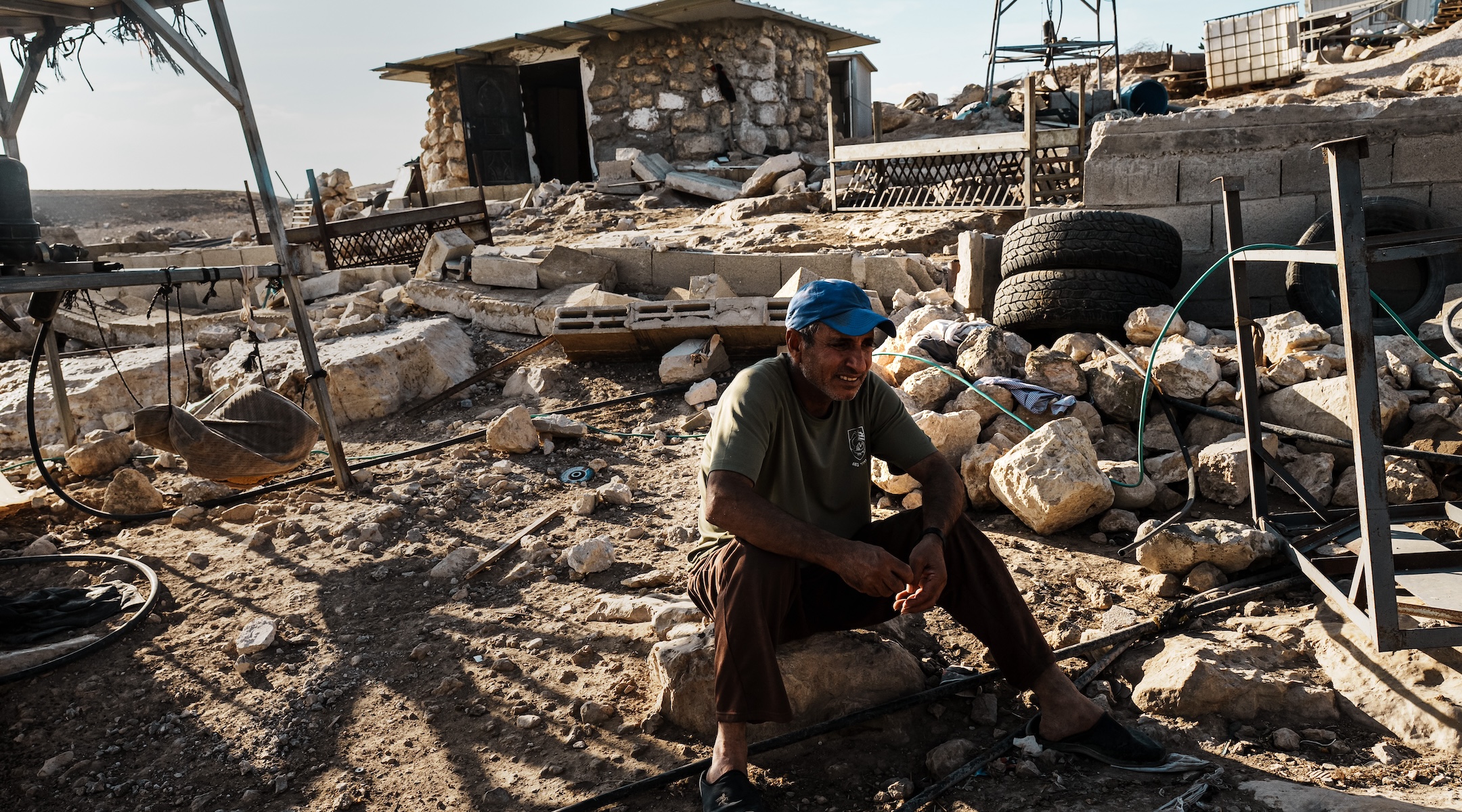US sanctions Israeli nonprofit that supports West Bank settlers in latest round of penalties
The nonprofit, Hashomer Yosh, receives regular funding from Israeli government ministries

Hamad Melhem al Hudarat reacts as he watches other Palestinian families pack up their belongings, dismantle their homes and uproot their lives along with other Palestinians after a decision was made as a community to leave due to repeated reports of Israeli settler violence and harassment, in the village of Khirbet Zanuta, in the West Bank, Oct. 30, 2023. (Marcus Yam/ Los Angeles Times)
(JTA) — The United States announced sanctions against a nonprofit that has received funding from the Israeli government as well as the civilian security chief of a West Bank settlement.
The sanctions are the United States’ latest effort to curb extremism among settlers, and come as violence in the West Bank has escalated.
The nonprofit, Hashomer Yosh, was founded a decade ago with the stated mission of supporting and protecting farms in Israeli West Bank settlements. In its announcement of sanctions on Wednesday, the State Department accused the nonprofit of giving “material support” to an Israeli outpost and to settlers who are already under U.S. sanctions, in addition to fencing off the Palestinian village of Khirbet Zanuta to prevent the return of 250 Palestinian residents who had been driven off their land.
Also sanctioned on Wednesday was Yitzhak Levi Filant, the civilian security coordinator of the Yitzhar settlement in the West Bank. The State Department accused him of “malign activities” including leading a group of armed settlers in a February attack on Palestinians, aiming to expel them from their lands.
The penalties announced Wednesday were the latest round of several rounds of American sanctions to be placed on far-right Israeli settlers and the groups aiding them. Over the course of this year, the State Department has sanctioned several individual settlers, West Bank outposts, far-right organizations accused of supporting sanctioned individuals and a group that has sought to block aid from entering Gaza.
The State Department says that these sanctions are intended to urge the Israeli government to hold its citizens accountable when they commit violence against Palestinians in the West Bank.
“Extremist settler violence in the West Bank causes intense human suffering, harms Israel’s security, and undermines the prospect for peace and stability in the region,” the department said. “It is critical that the Government of Israel hold accountable any individuals and entities responsible for violence against civilians in the West Bank.”
This new round of sanctions comes amid escalating conflict in the West Bank, including an Israeli airstrike and military operation in the Palestinian cities of Jenin and Tulkarm that has killed at least 10 people and prompted Israel’s foreign minister, Israel Katz, to call for civilian evacuations and post online that “This is a war.”
The Israeli military says that those killed in the ground operation were armed militants and that the airstrike targeted a terrorist base.
The Israeli government protested the sanctions, opposing what it perceives as inappropriate American intervention into its own affairs.
“Israel views with utmost severity the imposition of sanctions on citizens of Israel,” Prime Minister Benjamin Netanyahu’s office said in a statement. “The issue is in pointed discussion with the United States.”
Hashomer Yosh has received funding from Israel’s Agriculture Ministry and the Ministry of the Negev, Galilee, and National Resilience, according to its public disclosure filings in Israel. In response to the sanctions, the group claimed it is a lawful organization that supports Israeli agriculture.
“Sanctions on Hashomer are tantamount to sanctions on the State of Israel,” the organization said in a statement. “Together we will stand strong and continue to support Hebrew farming in the Land of Israel.”
Historically, the U.S. government has reserved economic sanctions for rare cases, such as the communist regime in Cuba. The Biden administration’s practice of sanctioning citizens of an allied country has surprised both supporters and critics of Israel. However, recent reporting in the Washington Post indicates that the use of sanctions has quietly become an increasingly common tool in American foreign policy in recent years.
J Street, the liberal Israel lobby, praised the sanctions as sending “a message to the Netanyahu government and its extremist ministers.”
The statement by the group’s president, Jeremy Ben-Ami, added, “It recognizes the active role some Israeli officials and security services are playing in supporting, encouraging and enabling settler violence. We cannot give them a free pass as they threaten Palestinian families, undermine Israel’s security, and violate our core Jewish values of peace, justice and equality.”















